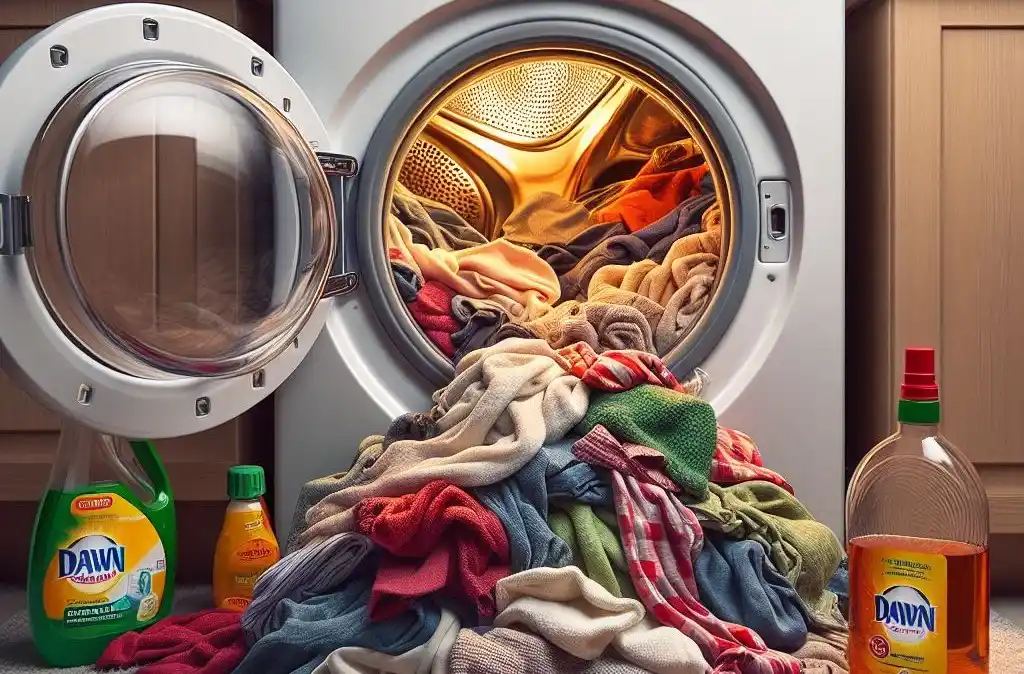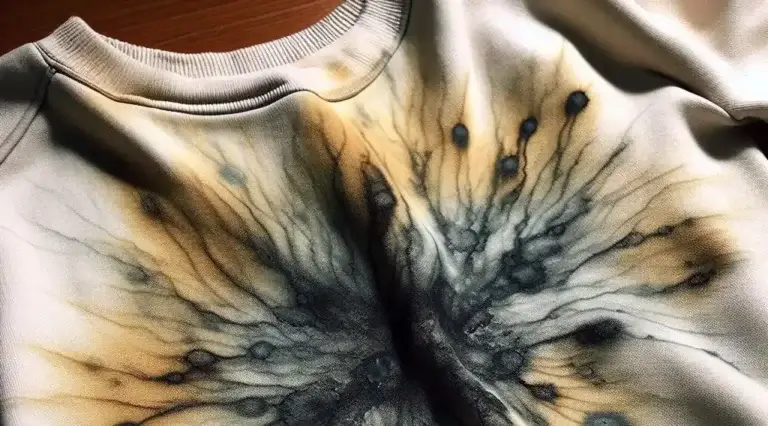Can You Use Dish Soap Instead of Laundry Detergent?
Have you ever found yourself about to do a load of laundry only to realize you’re completely out of laundry detergent? It’s a frustrating situation, but before you grab that bottle of dish soap as a substitute, you need to consider a few things.
Using dish soap in place of laundry detergent may seem like an easy fix, but it can damage your clothes and washing machine if not done carefully. In this article, we’ll explore dish soap instead of laundry detergent, the potential risks, which types work best, the proper dosage, and tips to get your clothes clean without ruining them.
Table of Contents
Can Dish Soap Be Used for Laundry?
The short answer is yes, you can use dish soap to wash your clothes in a pinch. Dish soap is designed to cut through grease on dishes, so it makes sense that it could also lift stains from laundry.
However, there are a few caveats to be aware of:
- Dish soap produces a lot more suds than laundry detergent, which can cause overflow in your washing machine.
- The cleaning agents in dish soap are often harsher and can damage delicate fabrics like silk, lace, and spandex over time, causing them to wear out faster.
- Some ingredients in certain dish soaps could leave residue on clothes that linger even after rinsing.
So while dish soap will technically get your clothes clean, laundry detergent is specially formulated to both clean fabrics and preserve their integrity over many wash cycles.
Using dish soap occasionally likely won’t ruin your clothes right away, but it shouldn’t become your go-to laundry solution. Read on for tips on how to use it safely if you have no other choice.
Is All Dish Soap the Same? Important Differences

Not all dish soaps are created equal when it comes to using them as laundry detergent. The type and formulation make a big difference in how well it will work and the potential for damaging clothes or your machine.
Here’s an overview of your options:
- Liquid dish soap – Produces lots of suds but is gentler than dishwasher detergent. Look for a formula without bleach.
- Dishwasher detergent – Harsher cleaning agents meant for the high-heat dishwasher environment. Avoid using it for laundry.
- Dish soap pods – Convenient but often contain concentrated formula not ideal for laundry. Can easily lead to using too much.
- Natural dish soaps – Often plant-based and free of dyes, perfumes, etc. Less likely to damage clothes.
The best choice is a free-and-clear, fragrance-free liquid dish soap. Popular brands like Dawn and Palmolive make unscented options perfect for laundry.
Steer clear of dishwasher detergents and soaps with added bleach or antibacterial ingredients. The key is using a gentle dish soap without extra additives. Check the label closely before using it on clothes.
Can Dish Soap Damage Your Washing Machine?
To understand if dish soap can damage a washing machine, you first need to recognize what makes it different than laundry detergent:
- Higher suds – Dish soap is specially formulated to cut through kitchen grease and oils. As a result, it creates mounds of thick, billowy suds. Most washing machines can’t handle quite that many bubbles. The interior washer tub can overflow, leaking sudsy water onto the floor. At best, this will lead to a cleanup. At worst, it could damage machine components.
- More difficult to rinse – Clothes washed in dish soap tend to retain more soap residue compared to laundry detergent. This residue can leave clothes stiff and rough to the touch, almost crunchy feeling. The abrasive nature of the residue can also accumulate inside hoses and pipes within the washer. Over time this can lead to clogs and even corrosion.
Most washing machine manufacturers recommend avoiding dish soap for these reasons. That said, using it sparingly on occasion likely won’t cause lasting damage. Just don’t make it a habit and be sure to rinse clothes thoroughly.
Also, consider wiping out the washer tub when finished to remove any leftover residue. Pay attention to signs of damage like leaks, odd noises, mold, etc. Discontinue use if any of those occur after washing with dish soap.
How Much Dish Soap to Use for Laundry

When it comes to how much dish soap to use for laundry, start with very small amounts – a little goes a long way!
For a standard load, add roughly 1-2 tablespoons of liquid dish soap. Measure carefully to prevent overflow suds. Still not enough bubbles? You can gradually add more, up to 1/4 cup at most.
Compare that to laundry detergent where a full standard load would use 2-3 tablespoons of powder or liquid detergent.
Be even more conservative with smaller or delicate loads – start with 1 teaspoon of dish soap and add more slowly as needed.
Remember – dish soap is a degreaser, so it takes very little to effectively lift stains and soils from laundry. Don’t just pour it in like you would detergent or you’ll likely have a bubbly, sudsy mess!
Step-By-Step Guide to Washing Clothes With Dish Soap

If you do opt to use dish soap in your laundry, follow these steps for the best results:
1. Choose Your Dish Soap Wisely
Read the label closely and avoid types with added bleach, antibacterial ingredients, or strong perfumes. Fragrance-free liquid dish soap works best.
2. Sort Clothes Appropriately
Check clothing care labels and sort into loads for warm, cold, etc water temperatures. Be extra cautious with silks, wools, spandex, and other delicates as dish soap can be harsher than laundry detergent. Washing those fabrics separately on a gentle cycle is best.
3. Use a Conservative Amount of Dish Soap
For a standard load, start with just 1-2 tablespoons then work up from there if needed. For small, delicate loads, stick to 1 teaspoon or less.
4. Let the Washer Agitate
Allow the washer to fill and agitate the clothes for a few minutes before adding more dish soap to allow time for the suds to develop. Too many too fast can lead to overflow.
5. Add More Dish Soap Slowly If Needed
Gradually add small amounts of additional dish soap until you achieve the desired suds level and cleaning power. Typically no more than 1/4 cup for a whole standard load.
6. Allow Extra Rinse Cycles
Run an extra rinse cycle or two to remove residual soap film. This helps protect your washing machine and keeps clothes from feeling stiff.
7. Clean Out Washer Tub Afterwards
Use a microfiber cloth to wipe out any suds or film left behind inside the washer tub once finished. This simple step helps prevent buildup and damage over time.
Top 10 Alternatives to Dish Soap for Laundry
While effective in a true emergency when you’re out of laundry detergent, dish soap is risky to use long-term. You’re better off trying one of these alternatives that are specially formulated to both clean clothes and be gentle on fabrics:
1. Liquid Castille Soap – Made from all vegetable oils. More gentle than dish soap.
2. Laundry Detergent for Sensitive Skin – Free of dyes, perfumes, and common irritants.
3. Baby Shampoo – Extra gentle cleanser designed for delicate skin and hair.
4. All-Natural Bar Soap – Grated into flakes then dissolved in water before adding clothes.
5. Borax – An effective laundry booster, also works well alone in a pinch.
6. Washing Soda – Removes stains, odors, etc. Goes especially well paired with Borax.
7. Baking Soda – Deodorizes and brightens laundry while helping to lift soil. Safe for all machines.
8. Liquid Hand Soap – Look for dye and fragrance-free varieties. Creates less suds than dish soap.
9. Vinegar – With laundry detergent – vinegar helps remove soap residue that causes dinginess. Alone, acts as a fabric softener and deodorizer.
10. Hydrogen Peroxide – If diluted with water, it can lift stains without damaging delicate fabrics.
While not perfect substitutes, these laundry helpers can often be found in the average household and work in a pinch when detergent runs out. With a bit of trial and error, you can generally get clothes clean without resorting to dish soap.
FAQs About Using Dish Soap as Laundry Detergent
Still, have questions about substituting dish soap for laundry detergent? Here are answers to some of the most common queries:
Is dish soap as effective as laundry detergent?
Dish soap is an effective degreaser and will lift stains from clothing in most cases. However, laundry detergents contain additional ingredients to brighten, soften, and protect fabrics over repeat washings. Used occasionally dish soap can clean clothes but shouldn’t replace detergent long term.
What scent of dish soap is best?
Fragrance-free dish soap is ideal as it won’t leave lingering perfumes on freshly washed clothes. Added perfumes and dyes also increase the chances of irritation or allergic reactions.
Can I use dishwasher detergent for laundry?
Dishwasher detergents are too harsh to use for laundry in most cases. Stick to gentle, hand-washing liquid dish soap instead. Steer clear of dishwasher detergent pods too.
How much dish soap is too much in a washing machine?
A good rule of thumb is 1-2 tablespoons per standard load of laundry. For smaller/delicate loads use 1 teaspoon or less. Never exceed 1/4 cup total as too many suds can damage your machine. Increase the amount slowly and carefully, allowing the machine to agitate first before adding more to prevent overflow.
What settings should I choose to wash clothes with dish soap?
Sort clothes by fabric and recommend wash temperatures first. Then opt for a small or medium load setting on your machine along with the permanent press wash cycle. This slower cycle with gentle agitation allows dish soap to lift stains without being too harsh. Using the highest soil level ensures a thorough wash. Adding an extra rinse cycle helps remove more soap residue too.
Conclusion: Dish Soap Instead of Laundry Detergent
Dish soap might be tempting to use when your laundry detergent runs out, but the risks likely outweigh the benefits. The harsh, sudsy formula can damage fabrics over time and lead to washing machine issues if used improperly or too frequently.
In a true emergency, dish soap can get the job done with careful use. But whenever possible, stick to gentle, laundry-specific detergents or all-natural cleaners instead. Your clothes and washer will thank you in the long run!








